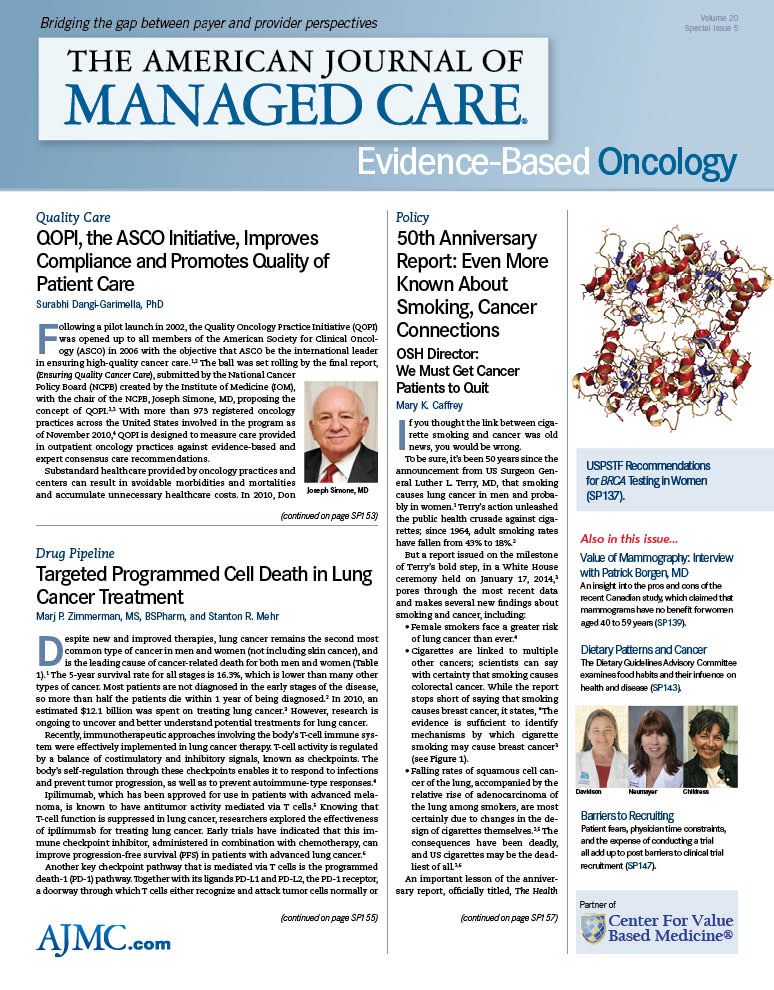- Center on Health Equity & Access
- Clinical
- Health Care Cost
- Health Care Delivery
- Insurance
- Policy
- Technology
- Value-Based Care
Nivolumab Provides Favorable Results in Patients With Advanced Melanoma
Programmed cell death-1 (PD-1) is a key immune inhibitory receptor expressed by activated T-cells and B-cells. Binding of PD-1 to its ligands PD-L1 and PD-L2, expressed on antigen presenting cells and cancer cells, turns off T-cell signaling to the lymphocytes and allows tumor cells to shut off the immune response. Many solid tumor types express PD-L1, and its expression is often associated with a worse prognosis. Blocking PD-1 is the novel approach being evaluated in cancer treatment and it has been reaping extremely favorable results (see “Targeted Programmed Cell Death in Lung Cancer Treatment,” cover).
A recent phase 1 trial report published in the Journal of Clinical Oncology evaluated the effect of intravenous nivolumab in 107 patients with advanced melanoma in an outpatient setting, every 2 weeks for up to 96 weeks. The patients were observed for overall survival (OS), long-term safety, and response duration after treatment discontinuation.
Patients receiving nivolumab had a median OS of 16.8 months; the 1- and 2-year survival rates were 62% and 43%, respectively. Of 33 patients with objective tumor regressions (31%), the estimated median response duration was 2 years.Of the 17 patients who discontinued therapy (not due to disease progression), 12 maintained a response for at least 16 weeks (range was 16 to 56 weeks).
Objective responses were observed in 33 of 107 patients, and 7 patients’ experienced stable disease lasting at least 24 weeks. Durable responses were observed across all the tested doses (0.1- to 10-mg/kg) of nivolumab. Unconventional response patterns that did not meet response evaluation criteria in solid tumors (RECIST) were observed in 4 patients. Of the 11 patients in whom the disease progressed at doses of 0.1- or 0.3-mg/kg nivolumab, dose escalation to 1.0-mg/kg did not help. Tumor regression in the 33 patients was observed at various sites, in both primary and metastatic lesions.
The most common adverse events observed included fatigue, rash, and diarrhea. Twenty-four of the 107 patients experienced grade 3 to 4 treatment-related adverse events. Treatment-related adverse events included skin disorders, GI events, and endocrinopathies. Although no drug-related deaths were observed in patients with melanoma, 3 treatment-related mortalities were observed in the overall population (2 patients with non-small cell lung cancer and 1 with colorectal cancer) associated with pneumonitis. Most adverse events were observed in the first 6 months of treatment; no cumulative toxicities were observed over a 2-year safety follow-up period.

Building Trust: Public Priorities for Health Care AI Labeling
January 27th 2026A Michigan-based deliberative study found strong public support for patient-informed artificial intelligence (AI) labeling in health care, emphasizing transparency, privacy, equity, and safety to build trust.
Read More
Ambient AI Tool Adoption in US Hospitals and Associated Factors
January 27th 2026Nearly two-thirds of hospitals using Epic have adopted ambient artificial intelligence (AI), with higher uptake among larger, not-for-profit hospitals and those with higher workload and stronger financial performance.
Read More
Motivating and Enabling Factors Supporting Targeted Improvements to Hospital-SNF Transitions
January 26th 2026Skilled nursing facilities (SNFs) with a high volume of referred patients with Alzheimer disease and related dementias may work harder to manage care transitions with less availability of resources that enable high-quality handoffs.
Read More
Specialty and Operator Status Influence Electronic Health Record Use Variation
January 22nd 2026Operators demonstrated specialty-specific differences in electronic health record efficiency, timeliness, and after-hours use, highlighting how workflow and training shape documentation behaviors across medical disciplines.
Read More

